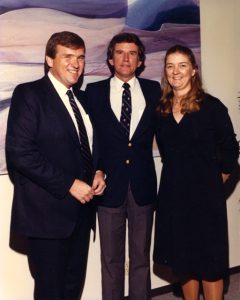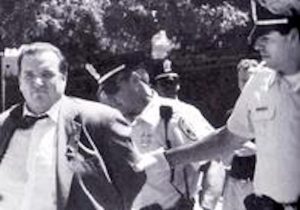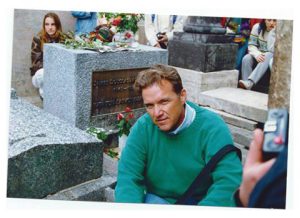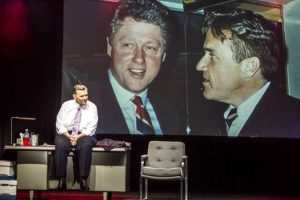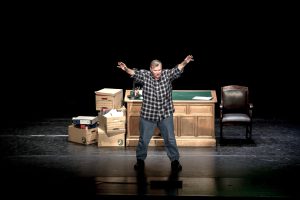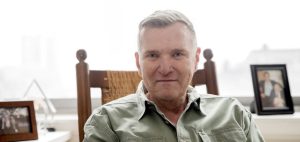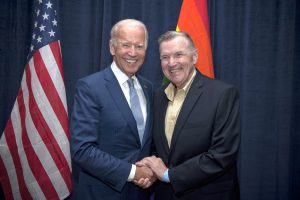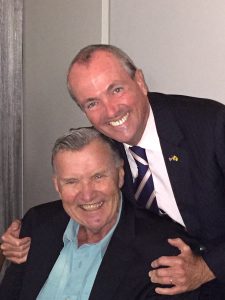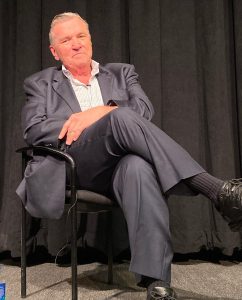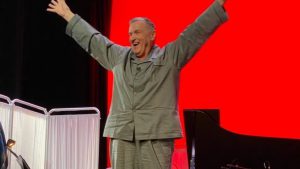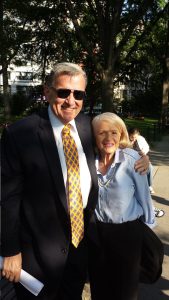David (on left) on the farm he and his family worked on, 1950. Photo courtesy of David Mixner.
David attending the Democratic National Convention for the Mississippi Freedom Democratic Party, Atlantic City, NJ, 1964. Photo courtesy of David Mixner.
David visiting the White House for the first time, Washington, DC, 1969.
David at the “March Against Death” [anti-Vietnam War demonstrations], Washington, DC, 1969. The sign around his neck bears the name “William F. Young”, who was a soldier killed in battle. Photo courtesy of David Mixner.
David McEwan, Senator Gary Hart, and his sister Patsy McEwan. David served as Co-Chair of Hart’s 1984 presidential campaign. Photo courtesy of David Mixner.
David getting arrested in front of the White House over his activism against the “Don’t Ask Don’t Tell” policy, Washington, DC, 1993. Photo courtesy of David Mixner.
David at Jim Morrison’s grave in Paris, France, 1993. Photo courtesy of David Mixner.
David in the production of Oh Hell No!, New York, NY, 2005. Photo courtesy of David Mixner.
David in the production of Oh Hell No!, Milan, Italy. Photo courtesy of David Mixner.
A portrait of David Mixner. Photo courtesy of David Mixner.
Vice President Joe Biden and David Mixner shaking hands, 2018. Photo courtesy of David Mixner.
David Mixner and Governor Phil Murphy of New Jersey, 2018. Photo courtesy of David Mixner.
A portrait of David Mixner. Photo courtesy of David Mixner.
A portrait of David Mixner from the production of You Make Me Sick, New York, NY, 2019. Photo courtesy of David Mixner.
David Mixner and his dear friend Edie Windsor, the lead plaintiff in the Supreme Court case United States v. Windsor which resulted in overturning the Defense of Marriage Act (DOMA), a major milestone on the path to marriage equality. Photo courtesy of David Mixner.
David Mixner was born on August 16, 1946, and grew up dirt poor in the town of Elmer, New Jersey. David says his early values were formed by “two Johns and a King”: John F. Kennedy (whom his mother called Saint John), Pope John XXIII (an early voice of liberation theology), and the Rev. Dr. Martin Luther King. From these men, David says, he learned that “God puts you here on earth for only one reason: to serve others.”
In high school, David learned that Northern youth were going into the Deep South to lend their support to the Civil Rights Movement. After graduation, David headed to Mississippi, where he found himself staying in the home of a pig farmer and civil rights activist named Fannie Lou Hamer. One evening, terrified at the prospect of being arrested, David started crying. He beseeched Ms. Hamer to share the secret of her courage. Ms. Hamer replied, “Honey, courage is just a lack of options.”
In 1964, David enrolled at Arizona State University, and quickly became involved in organizing sanitation workers there. He soon left Arizona for the University of Maryland, closer to the centers of political action and the Civil Rights movement. In 1968, he was beat up by the police outside the Democratic Convention in Chicago. He fought to end the War in Vietnam, and eventually landed in Los Angeles, where he helped form Municipal Elections Committee of Los Angeles (MECLA), the nation’s first gay and lesbian political action committee. Soon after, David helped defeat California’s potentially disastrous Proposition 6, which would have made it illegal for homosexuals to teach in public schools, by getting then-Governor Ronald Reagan to come out publicly against the measure. David’s political star kept rising, until in 1992, he became the first openly gay person to serve on a national presidential campaign, helping his former roommate Bill Clinton to win the White House. Even before Clinton’s inauguration, the relationship soured—more so when Clinton broke his promise to issue an executive order allowing gay men and lesbians to serve openly in the military. When David was arrested for protesting Don’t Ask Don’t Tell outside the White House, it was national front page news. David’s political consulting career was over, and by the end of the Clinton presidency, he was pawning his watches to pay rent.
Since those turbulent days, David has re-invented himself numerous times—as a writer, a performer, and the organizer of a national equality march in 2009 where more than 200,000 mostly young people showed up. In 2017, his play 1969 was staged at the Florence Gould Hall Theater in New York City, and in 2018, David’s performance of his one-man play Who Fell Into the Outhouse? raised $175,000 for homeless queer youth. David’s heroes today are the Parkland activists and climate activist Greta Thunberg. “It’s time for new blood,” he says. He also says, “No one will ever silence me.” In times of adversity, David always has Fannie Lou Hamer’s words, as well as her courage, to fall back on.

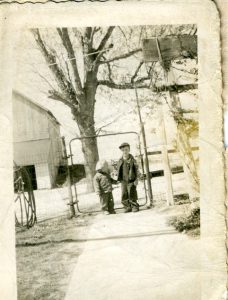
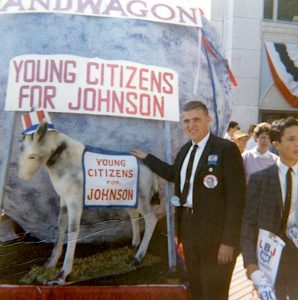
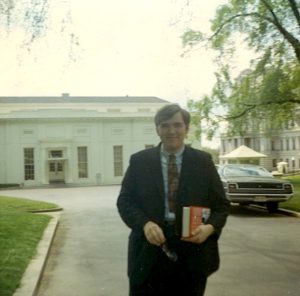
![David at the “March Against Death” [anti-Vietnam War demonstrations], Washington, DC, 1969. The sign around his neck bears the name “William F. Young”, who was a soldier killed in battle. Photo courtesy of David Mixner.](https://theoutwordsarchive.org/wp-content/uploads/2022/06/david-mixner-3-300x236.jpg)
